牛津上海版英语六年级第二册6BM3U9sea water and rain water
- 格式:ppt
- 大小:7.13 MB
- 文档页数:46
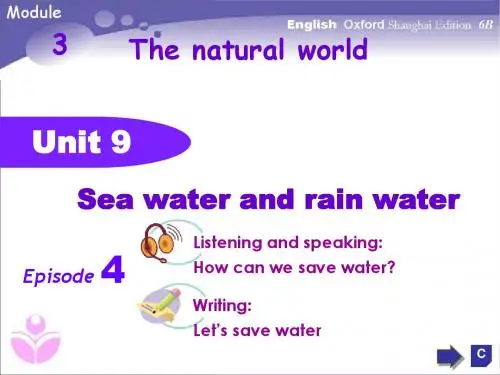
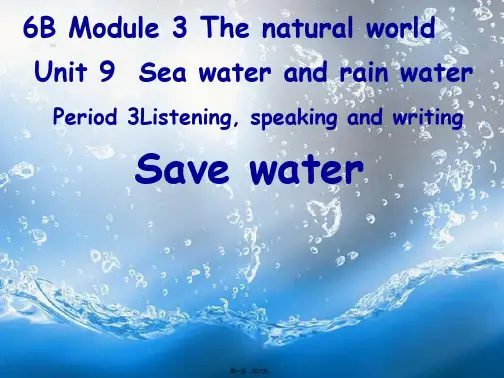
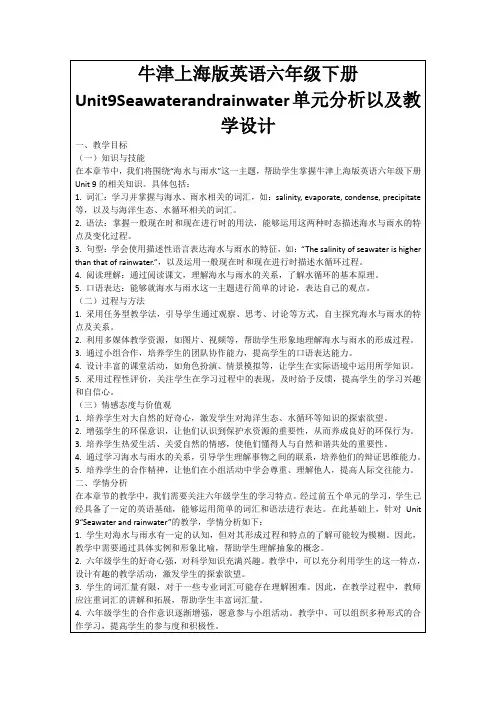
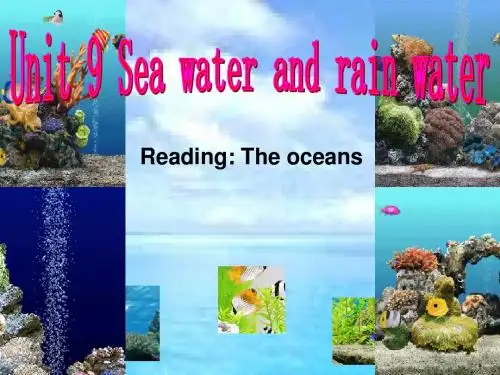
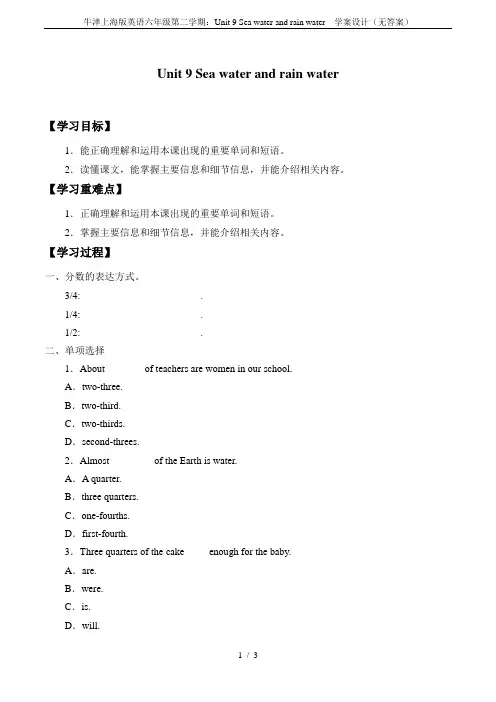
Unit 9 Sea water and rain water【学习目标】1.能正确理解和运用本课出现的重要单词和短语。
2.读懂课文,能掌握主要信息和细节信息,并能介绍相关内容。
【学习重难点】1.正确理解和运用本课出现的重要单词和短语。
2.掌握主要信息和细节信息,并能介绍相关内容。
【学习过程】一、分数的表达方式。
3/4: ______________________.1/4: ______________________.1/2: ______________________.二、单项选择1.About _______ of teachers are women in our school.A.two-three.B.two-third.C.two-thirds.D.second-threes.2.Almost ________ of the Earth is water.A.A quarter.B.three quarters.C.one-fourths.D.first-fourth.3.Three quarters of the cake ____ enough for the baby.A.are.B.were.C.is.D.will.4.A quarter of these apples ____ too much for me, but three quarters of the water ____ not too much.A.is, is.B.are, is.C.is, are.D.are, are.三、Whales are the largest animals on the Earth.large- larger (比较级) - the largest(最高级)形容词的最高级用于三者或以上人或物之间的比较,表示“最……”含义。
(一)形容词最高级的构成:(单音节或双音节形容词)a) 一般在词尾加-est:high--- the highest;tall --- _________.b) 以字母e结尾的形容词,在词尾加-st:fine--- the finest;nice --- _________.c) 以重读闭音节结尾,则双写结尾字母再加-est:big --- the biggest;fat---___________;thin--- __________.d) 以辅音字母+y结尾,把y变成i,再加-est:easy--- the easiest;early--- _________;heavy--- _________.(多音节形容词)多音节形容词的最高级在前面加most:beautiful --- the most beautiful;dangerous ---_______________;intelligent --- ______________;important ---_______________.不规则形容词:good --- the best;many/much--- the most;little --- the least.(二)句中出现由介词of, in, on组成的短语,暗示是三者以上的比较时,用最高级。
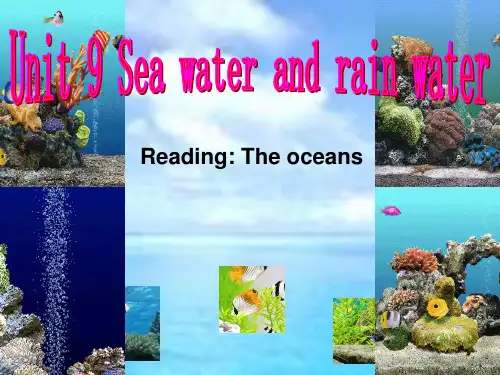
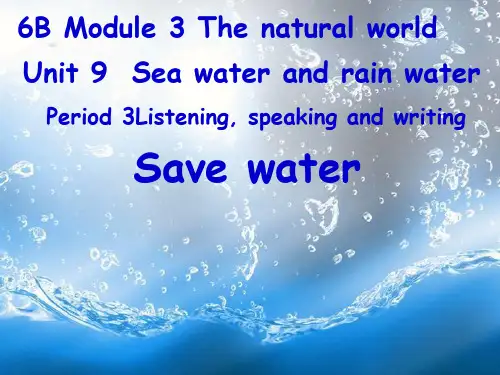
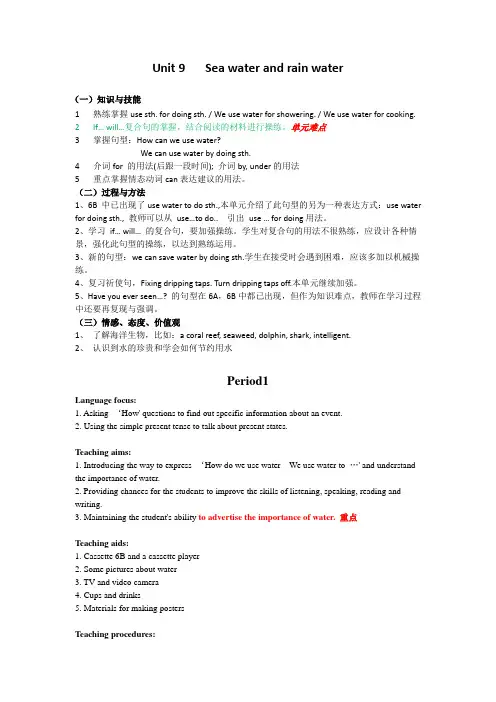
Unit 9 Sea water and rain water(一)知识与技能1熟练掌握use sth. for doing sth. / We use water for showering. / We use water for cooking. 2If… will…复合句的掌握,结合阅读的材料进行操练。
单元难点3掌握句型:How can we use water?We can use water by doing sth.4介词for 的用法(后跟一段时间); 介词by, under的用法5重点掌握情态动词can表达建议的用法。
(二)过程与方法1、6B 中已出现了use water to do sth.,本单元介绍了此句型的另为一种表达方式:use water for doing sth., 教师可以从use…to do.. 引出use … for doing用法。
2、学习if… will…的复合句,要加强操练。
学生对复合句的用法不很熟练,应设计各种情景,强化此句型的操练,以达到熟练运用。
3、新的句型:we can save water by doing sth.学生在接受时会遇到困难,应该多加以机械操练。
4、复习祈使句,Fixing dripping taps. Turn dripping taps off.本单元继续加强。
5、Have you ever seen…? 的句型在6A,6B中都已出现,但作为知识难点,教师在学习过程中还要再复现与强调。
(三)情感、态度、价值观1、了解海洋生物,比如:a coral reef, seaweed, dolphin, shark, intelligent.2、认识到水的珍贵和学会如何节约用水Period1Language focus:1. Asking ‘How' questions to find out specific information about an event.2. Using the simple present tense to talk about present states.Teaching aims:1. Introducing the way to express ‘How do we use water We use water to …' and understand the importance of water.2. Providing chances for the students to improve the skills of listening, speaking, reading and writing.3. Maintaining the student's ability to advertise the importance of water. 重点Teaching aids:1. Cassette 6B and a cassette player2. Some pictures about water3. TV and video camera4. Cups and drinks5. Materials for making postersTeaching procedures:I. Warming up:The students read a poem titled “Water all around us”II. Pre-task preparation1. To introduce the new lesson Using Water, I would invite students to taste 3 different types water-related liquids and guess what they are.2. The students will listen to the tape and repeat after it.3. The students will work in groups and then be given a few words on paper to create sentences with by putting them in the correct order. This will create the main question: How do we use water We use water to …4. They will read these sentences, a way for them to get an impression of the key phrases: How do we use water We use water to…III. While-task procedure1. The students will be shown some slides about the use of water and read the phrases on the slides.2. The students will then get into pairs to ask and answer each other's questions like this: How do we use water We use water to…(referring to the slides)3. The students play charades. One will perform a silent action to do with water and a pair of students will ask each other by using the structure:How do we use water We use water to …IV. Post-task activity1. The students will be shown a picture and learn that we should save water.2. The students will choose between making a poster, a short dialogue or writing some slogans for “Water Day”.3. The students will present their work to the whole class.V. Assignment1. Continue to prepare for the presentation on Water Day.2. Read the text after the recording3. Complete Workbook page 254. Write a short report on various ways of using water and give suggestions for saving water.Period 2Oral practiceText1.Learn: wood, charcoal, gas, electricity by pictures.2. Introduce: I like to cook with …I like …because …what do you like to cook with Why do you like to …and read the story to the students.3.Ask: What does Ben / Kitty like to cook with Why What does Ben / Kitty like better Why Ask: Who are they Where did they live …4. Recording: Read a story. Follow---Listen---Repeat5. Ask studentss to tell the story about Stone Age People by making use of the wallpictures.6. Finish T/ F individually. Read aloud and correct.7. Finish the book report.8. Read the book reports aloud.9. Collect them for marking.Homework:WB page 27 ,29 GB pageRead and recite the words and phrases and the text.Period 3Oral practiceText1. Learn: fire-warning, low, high, extreme. This is a …The fire danger is …2. Reviews:3. Recording: follow --- listen --- repeat. Ask: What does Ben like to cook with Why What does Grandma Wang like to cook with Why What does Kitty like to cook with4.Do pairwork, then role-play5. Show eight signs, ask What does this mean Write the correct answer under each sign6. Recording: follow ---listen ---repeat7. Play a game. Learn fire-safety, must, mustn’t, poster8. Read the text and act it out.9. Listen and draw.Homework:.Read and recite the words and phrases and the text.WBpage30 GB page 51Period 4Oral practiceText1. Show the poster: What else did Mark’s father sayHe said we must not smoke.2. Recording: follow ---listen ---repeat.3. The fire rules in our school: we should / must / mustn’t…4. Recording: follow --- listen --- repeat5. Photocopiable pages 6, 7. look at pictures and write the rules. Match the cut-out pictures with the rules.6. Write a rule on the board and draw the apprepriate picture.7. Listening test: page 25Homework:Recite the pastGB8Read and recite the words and phrases and the textNOTES: (单元教后记)1、本单元难点If… will…复合句的掌握,重点句型:How can we use water?We can use water by doing sth.。
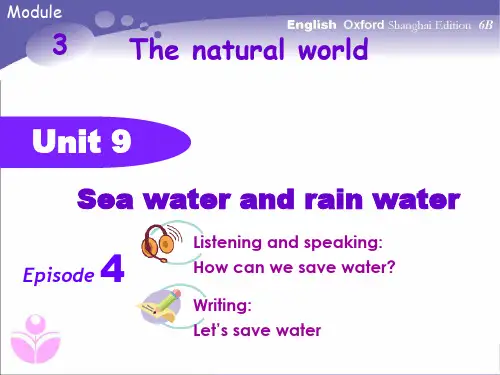
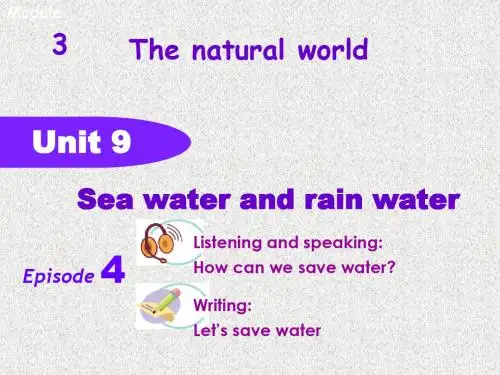
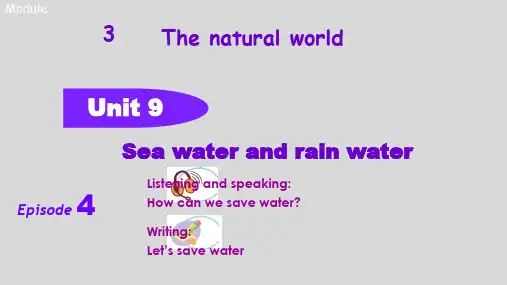
U9 Sea water and rain water知识点汇总一、重点单词二、重点短语三、重点句型1.几乎地球的四分之三是水。
2.许多鱼类和海洋动物生活在地球上的小溪、河流、湖泊、海洋。
3.鲸鱼是地球上最大的动物。
4.海豚是最聪明的动物之一。
5.渔民在深海用网捕鱼和捕虾。
6.我们必须停止砍伐森林。
7.如果没有雨,我们将没有水喝。
8.农民需要水来浇灌他们农场的庄稼和蔬菜。
9.我们可以通过修理漏水的水龙头来节约用水。
6.drip (n,)水滴(v.)滴下____________ (adj)滴水的巩固提升I. Filling in the blanks.(写出下列中英文)1.Making money is hard work. Don’t _____________ it. /ˈweɪstə/2.Happy farmland is a game which players can grow _____________. /krɒps/3.I’d like to find some information about water on the _____________. /'intənet/4.Knowing something about sea animals is very ___________. /ɪmˈpɔ:tnt/5.Danny is an _____________ boy in our class. /ɪnˈtelɪdʒənt/6.There is a beautiful_____________ between two mountains. /stri:m/7.About three quarters of the Earth is _____________ with water. /ˈkʌvəd/8.The _____________ show in Shanghai Wild Animal Park is very popular. /ˈdɒlfɪn/9.Our school canteen ________ lunch for us.[prəˈvaɪdz]10.Many ________ make their homes in the ________ of the trees. ['ɪnsekts] ['hɒləʊz]11.As we all know, a ________ is a large ________ of trees. [ˈfɒrɪst] [ˈeəriə]12.Some foreign visitors are learning to use__________. /'tʃɔpstiks/13.We need some new__________for our new flat. /'fə:nitʃə(r)/14.I like the clothes which are made of__________. /'kɔtn/15.The__________chair from IKEA is very fashionable. /'wudn/II.Choose the best answer(选择最恰当的答案)1.We can save water by not washing vegetables _________a running tap.A. atB. onC. inD. under2.You must fix the ________ tap.A.dripB. drippedC. drippingD. drips3.Whales are _________ animals on the Earth..A. the largeB. largestC. the largestD. the most large4.There is only ___________ drinking water in the world.A.littleB. a littleC. fewD. a few5.Can we get food _________the oceans?A. toB. fromC. forD. away6._________ can we do to save the world?A. WhatB. WhereC.WhichD. Who7.If I _________ time, I __________ to see you.A.have; goB. have; will goC. will have; goD. will have; will go8.Please turn _________ the TV. Tommy is doing homework.A. onB. offC. ofD. to9.We should not waste water in our daily life. How to pronounce the underlined part?A./ eɪ /B. / ɪ /C. / aɪ /D./ e /10.Firemen need water _________out fires.A. to putB. for putC. putD. putting11.Which sea animals do you like ___________, starfish or sea horses?A. betterB. bestC. manyD. most12.__________ important information it is!A.What B. What an C. How D. How an13.Here is a quiz __________ a school competition about water.A. withB. forC. toD. on14.What _________ important part water plays in our daily life!A. aB. anC. theD. /15.There _________ a new supermarket near our housing estate in a year.A. hasB. haveC. will haveD. will be16.We’ve got a lot of information about the topic. __________ very useful.A. They areB. It isC. They doD. It does17.Mary was ill, so Peter went to have a meeting ___________ herA.beforeB. instead ofC. in front ofD. because18.We can save money __________ snack.A.not to buyB. not buyingC. by not buyingD. not by buying19.__________ English is important ___________ everyone of us.A.Learning; toB. Learning; forC. Learn; toD. Learn; for20. A quarter of these apples __________ too much for me. But three quarters of the water________ not too much.A.is; isB. are; isC. is; areD. are; areIII.Fill in the blanks with the words in their proper forms (用所给词的适当形式填空)1.There are some _____________working in their farms. (farm)2.I’m too hot. I want to take a _____________(show).3.It is _______________ to learn English well. (importance)4.Dolphins are _______________ sea animals. (intelligence)5.The books are quite________________(interest).6.Eddie won a first prize in the reading ____________. (compete)7.My father is a ____________. He likes fishing very much. (fish)8.Shanghai is one of the ___________ cities in the world.(big)Ⅳ. Rewrite the following sentences as required(根据所给要求改写下列句子)1.We can go to a movie or the Ocean Park this Saturday. (改为否定句)We _________ __________ to a movie or the Ocean Park this Saturday.2.We should save water in our daily life.(改为一般疑问句)_________ we _________ water in our daily life?3.We can keep the room warm if we close the door. (保持句意不变)We can keep the room warm _________ __________ the door.4.Farmers can use water to water vegetables and crops. (对画线部分提问)What can farmers use water _________ __________ ?5.People can save paper by reusing it. (划线部分提问)_________ __________ people save paper ?6.We can take a shower to save water. We don’t have a bath. (合为一句)We can take a shower _________ __________ having a bath to save water.7.What other things can you see in the park?(同义句转换)_________ __________ can you see in the park?V. Reading Comprehension (阅读理解)A.Choose the words or expressions and complete the passage(选择最恰当的单词或词语完成短文)It was a Saturday afternoon. Mr Green was reading a newspaper. Suddenly he heard his wife 1 in the next room. He hurried to her and asked, "What happened to you, my dear?""Oh, dear!" his wife called out. "My head hurts! 2 a doctor. Hurry up!"Their twochildren were both out at that moment and something was wrong with the telephone. Mr. Green had to go to a hospital himself . Bad luck! That day all the hospitals in the town were 3 . Mr. Green didn't know where to go. Just then a friend of his saw him and asked, "What is the matter?"Mr. Green told everything. The man said, "Why not turn to 4 ? He can help you. "Mr. Green remembered his friend Mr. Black was a good doctor. He hurried to Mr. Black’s. When he got there, Mr. and Mrs. Black were having their 5 meal. The doctor asked Mr. Green to drink with him. He was happy and sat 6 . After that they began to chat. And when Mrs. Black asked," How is your wife?" "She is fine, thanks..."Mr. Green stopped at once---he remembered his wife was waiting for a doctor at home.1. A. crying B. laughing C. whispering D. singing2. A. Look for B. Wait for C. Send for D. Ask for3. A. expensive B. open C. free D. closed4. A. Mr. Brown B. Mr. Black C. Mr. Green D. Mrs. Green5. A. lunch B. supper C. morning D. evening6. A. in bed B. on floor C. at the table D. at homeB. Read the passage and fill in the blanks with suitable words(在短文的空格内填入适当的词,使其内容通顺。